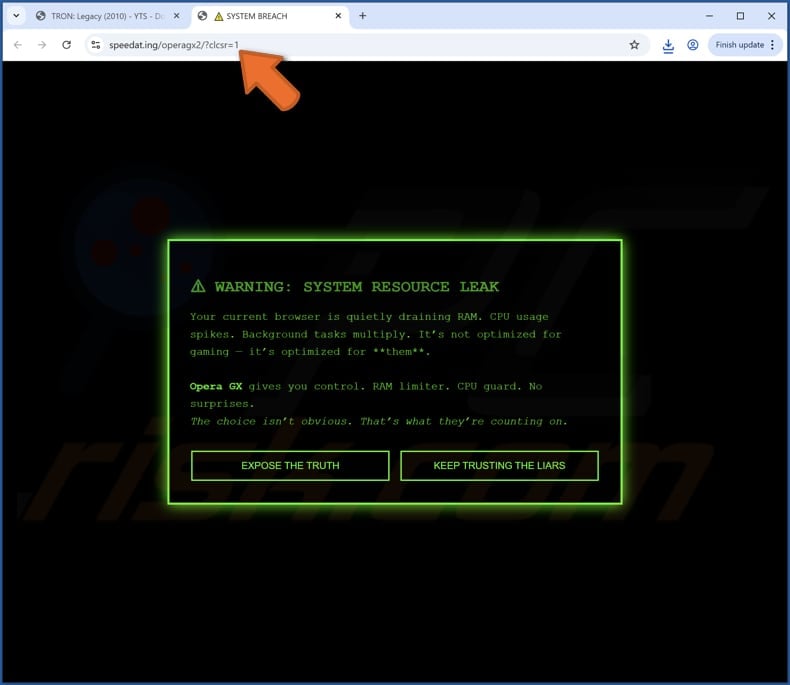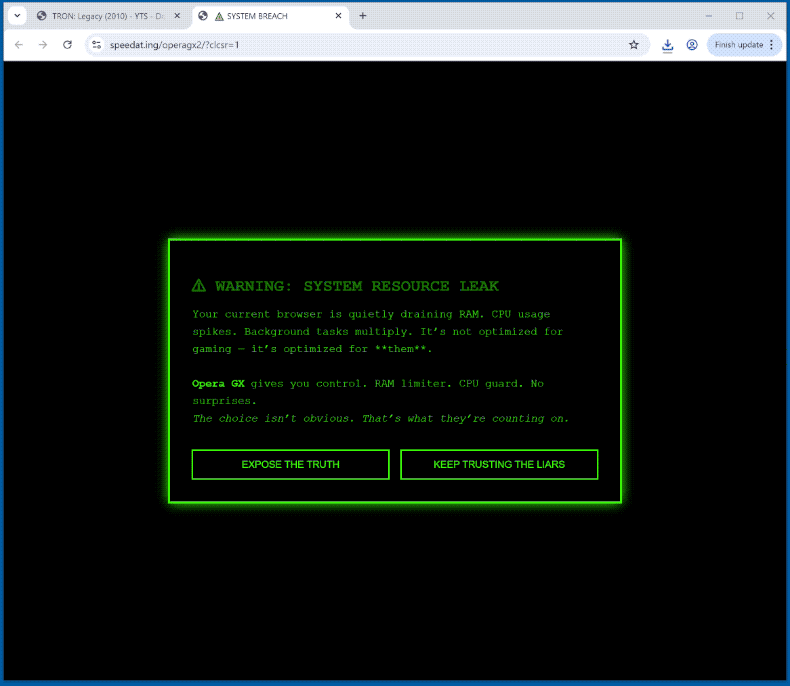How to identify scams like "WARNING: SYSTEM RESOURCE LEAK"
Phishing/ScamAlso Known As: WARNING: SYSTEM RESOURCE LEAK fake message
Get free scan and check if your device is infected.
Remove it nowTo use full-featured product, you have to purchase a license for Combo Cleaner. Seven days free trial available. Combo Cleaner is owned and operated by RCS LT, the parent company of PCRisk.com.
What kind of scam is "WARNING: SYSTEM RESOURCE LEAK"?
We have inspected the site and concluded that it is a scam involving a fake system resource leak warning. It promotes a legitimate software product, however, the method (a scare tactic) used by the site is fraudulent. Users should ignore such messages and close websites displaying them.

"WARNING: SYSTEM RESOURCE LEAK" scam in detail
This scam page displays a fraudulent warning about the user's computer performance. It claims that the browser is secretly consuming excessive RAM and causing CPU spikes. It warns that background tasks are multiplying and implies the current setup is deliberately designed to benefit someone else.
The page then promotes the Opera GX browser as a solution. It is important to note that Opera GX is a legitimate web browser designed specifically for gamers. The scam website is not officially associated with Opera GX. Often, such scams use affiliate revenue schemes. In such cases, scammers have a unique link that tracks who downloads the browser.
When a user clicks the link and installs the browser, the scammer earns a commission. Users should not trust websites that use scare tactics or other misleading methods, even when these pages promote legitimate products or services. It is advisable to use official sources to prevent scammers from earning money through fake schemes.
It is also worth noting that scams like these can be used to trick users into paying for fake products or services, disclosing sensitive information (e.g., login credentials or banking details), downloading malware, giving scammers remote access to computers, and other malicious purposes.
| Name | WARNING: SYSTEM RESOURCE LEAK fake message |
| Threat Type | Phishing, Scam, Social Engineering, Fraud |
| Fake Claim | WARNING: SYSTEM RESOURCE LEAK Scam |
| Disguise | Legitimate system resource leak warning |
| Related Domain | speedat[.]ing |
| Detection Names (speedat[.]ing) | alphaMountain.ai (Malicious), Forcepoint ThreatSeeker (Malicious), Fortinet (Malware), Webroot (Malicious), Full List Of Detections (VirusTotal) |
| Symptoms | Fake error messages, fake system warnings, pop-up errors, hoax computer scan. |
| Distribution methods | Compromised websites, rogue online pop-up ads, potentially unwanted applications. |
| Damage | Loss of sensitive private information, monetary loss, identity theft, possible malware infections. |
| Malware Removal (Windows) |
To eliminate possible malware infections, scan your computer with legitimate antivirus software. Our security researchers recommend using Combo Cleaner. Download Combo CleanerTo use full-featured product, you have to purchase a license for Combo Cleaner. 7 days free trial available. Combo Cleaner is owned and operated by RCS LT, the parent company of PCRisk.com. |
Similar scams in general
Scams like these trick users with fake warnings or urgent messages to make them take action. They often try to make money through affiliate links, fake products, or by stealing personal information. Users should only trust official sources to stay safe and prevent scammers from profiting.
Some examples of scams involving fake warnings or similar messages are "Windows Defender Security Has Disabled Your Computer", "SYSTEM SECURITY ALERT", and "Microsoft Has Temporarily Suspended Your Account".
How did I open a scam website?
Users often encounter scam websites through deceptive ads, links, buttons, or pop-ups on untrustworthy sites and emails containing misleading links or attachments. Malicious advertising networks used by torrent sites, adult platforms, illegal streaming services, and similar platforms also commonly lead to scam pages.
In other cases, unwanted browser extensions or adware and notifications from dubious web pages can direct users to fraudulent sites. These scams are promoted mainly through deceptive methods.
How to avoid visiting scam pages?
Be careful with emails or messages from unknown senders, especially if they are unexpected, irrelevant, or include links or attachments. Avoid clicking on suspicious ads or links, and never allow notifications from untrustworthy websites.
Always download software from official websites or reputable stores. Protect your device by using reliable antivirus programs and keeping your operating system and applications up to date. If your computer is already infected with unwanted apps, we recommend running a scan with Combo Cleaner Antivirus for Windows to automatically eliminate them.
The appearance of "WARNING: SYSTEM RESOURCE LEAK" pop-up scam (GIF):

Text in the fake warning:
WARNING: SYSTEM RESOURCE LEAK
Your current browser is quietly draining RAM. CPU usage spikes. Background tasks multiply. It's not optimized for gaming — it's optimized for **them**.
Opera GX gives you control. RAM limiter. CPU guard. No surprises.
The choice isn't obvious. That's what they're counting on.
EXPOSE THE TRUTH
KEEP TRUSTING THE LIARS
Instant automatic malware removal:
Manual threat removal might be a lengthy and complicated process that requires advanced IT skills. Combo Cleaner is a professional automatic malware removal tool that is recommended to get rid of malware. Download it by clicking the button below:
DOWNLOAD Combo CleanerBy downloading any software listed on this website you agree to our Privacy Policy and Terms of Use. To use full-featured product, you have to purchase a license for Combo Cleaner. 7 days free trial available. Combo Cleaner is owned and operated by RCS LT, the parent company of PCRisk.com.
Quick menu:
- What is WARNING: SYSTEM RESOURCE LEAK fake message?
- How to identify a pop-up scam?
- How do pop-up scams work?
- How to remove fake pop-ups?
- How to prevent fake pop-ups?
- What to do if you fell for a pop-up scam?
How to identify a pop-up scam?
Pop-up windows with various fake messages are a common type of lures cybercriminals use. They collect sensitive personal data, trick Internet users into calling fake tech support numbers, subscribe to useless online services, invest in shady cryptocurrency schemes, etc.
While in the majority of cases these pop-ups don't infect users' devices with malware, they can cause direct monetary loss or could result in identity theft.
Cybercriminals strive to create their rogue pop-up windows to look trustworthy, however, scams typically have the following characteristics:
- Spelling mistakes and non-professional images - Closely inspect the information displayed in a pop-up. Spelling mistakes and unprofessional images could be a sign of a scam.
- Sense of urgency - Countdown timer with a couple of minutes on it, asking you to enter your personal information or subscribe to some online service.
- Statements that you won something - If you haven't participated in a lottery, online competition, etc., and you see a pop-up window stating that you won.
- Computer or mobile device scan - A pop-up window that scans your device and informs of detected issues - is undoubtedly a scam; webpages cannot perform such actions.
- Exclusivity - Pop-up windows stating that only you are given secret access to a financial scheme that can quickly make you rich.
Example of a pop-up scam:

How do pop-up scams work?
Cybercriminals and deceptive marketers usually use various advertising networks, search engine poisoning techniques, and shady websites to generate traffic to their pop-ups. Users land on their online lures after clicking on fake download buttons, using a torrent website, or simply clicking on an Internet search engine result.
Based on users' location and device information, they are presented with a scam pop-up. Lures presented in such pop-ups range from get-rich-quick schemes to fake virus scans.
How to remove fake pop-ups?
In most cases, pop-up scams do not infect users' devices with malware. If you encountered a scam pop-up, simply closing it should be enough. In some cases scam, pop-ups may be hard to close; in such cases - close your Internet browser and restart it.
In extremely rare cases, you might need to reset your Internet browser. For this, use our instructions explaining how to reset Internet browser settings.
How to prevent fake pop-ups?
To prevent seeing pop-up scams, you should visit only reputable websites. Torrent, Crack, free online movie streaming, YouTube video download, and other websites of similar reputation commonly redirect Internet users to pop-up scams.
To minimize the risk of encountering pop-up scams, you should keep your Internet browsers up-to-date and use reputable anti-malware application. For this purpose, we recommend Combo Cleaner Antivirus for Windows.
What to do if you fell for a pop-up scam?
This depends on the type of scam that you fell for. Most commonly, pop-up scams try to trick users into sending money, giving away personal information, or giving access to one's device.
- If you sent money to scammers: You should contact your financial institution and explain that you were scammed. If informed promptly, there's a chance to get your money back.
- If you gave away your personal information: You should change your passwords and enable two-factor authentication in all online services that you use. Visit Federal Trade Commission to report identity theft and get personalized recovery steps.
- If you let scammers connect to your device: You should scan your computer with reputable anti-malware (we recommend Combo Cleaner Antivirus for Windows) - cyber criminals could have planted trojans, keyloggers, and other malware, don't use your computer until removing possible threats.
- Help other Internet users: report Internet scams to Federal Trade Commission.
Frequently Asked Questions (FAQ)
What is a pop-up scam?
A pop-up scam is an unexpected alert or window that appears while browsing, usually from a suspicious or untrustworthy site.
What is the purpose of a pop-up scam?
These scams are used to steal money or information, distribute malware, gain remote access to computers, or for other malicious purposes.
Why do I encounter fake pop-ups?
Users are often directed to scam websites through misleading ads, links, pop-ups, emails, or notifications from untrustworthy sites. Malicious ad networks (on pages offering torrents, illegal movie streaming, and similar sites), unwanted browser extensions, and adware also commonly lead to these fraudulent pages.
Will Combo Cleaner protect me from pop-up scams?
Combo Cleaner scans websites and can identify harmful ones. Websites that display fake pop-ups or host other scams are also included, so the software alerts users and blocks access.
Share:

Tomas Meskauskas
Expert security researcher, professional malware analyst
I am passionate about computer security and technology. I have an experience of over 10 years working in various companies related to computer technical issue solving and Internet security. I have been working as an author and editor for pcrisk.com since 2010. Follow me on Twitter and LinkedIn to stay informed about the latest online security threats.
PCrisk security portal is brought by a company RCS LT.
Joined forces of security researchers help educate computer users about the latest online security threats. More information about the company RCS LT.
Our malware removal guides are free. However, if you want to support us you can send us a donation.
DonatePCrisk security portal is brought by a company RCS LT.
Joined forces of security researchers help educate computer users about the latest online security threats. More information about the company RCS LT.
Our malware removal guides are free. However, if you want to support us you can send us a donation.
Donate
▼ Show Discussion